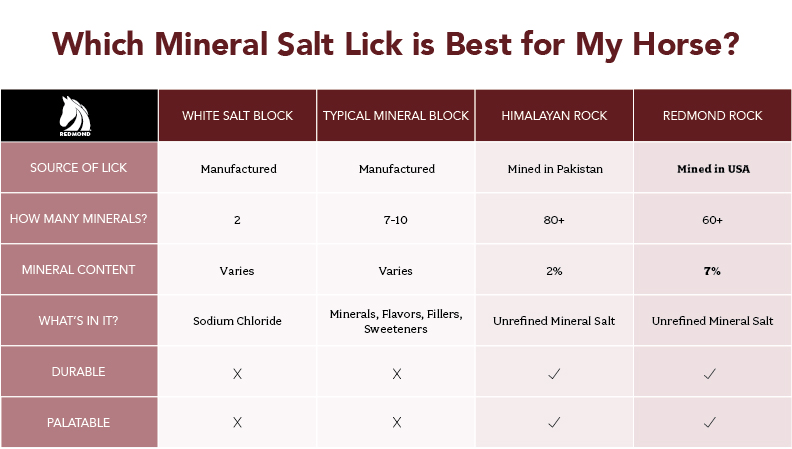Rock Salt vs. Mineral or Salt Block for Horses—Which is Best?
June 01, 2023
Rock Salt vs. Mineral or Salt Block for Horses—Which is Best?
When it comes to horse health, there is one often overlooked essential: salt! Whether in the form of a mineral salt block or natural rock salt, providing horses access to this nutrient is vital.
There are a lot of horse salt licks out there, though, and the options can be overwhelming. So which is best? Should you opt for the simplicity of a white salt block? Explore the benefits of a mineral block? Or ditch the block and go with a natural rock salt?
Let's take a closer look at why horses need salt, then compare the health benefits and distinctions between free-choice salt blocks and mined rocks. Afterward, you'll be able to make a more informed choice that helps keep your equine companion thriving.
Why Do Horses Need (and Like) Salt and Minerals?
First things first: whether salt should be a staple in your horse's diet isn't up for debate. Salt is essential for life. And since it is not produced by the body, salt must be provided to horses in some form—like a salt lick. As Dr. Lori Warren with the University of Florida notes, "all horses, regardless of age or productivity level, need a supplemental source of salt."
In addition to its critical role in providing a trigger for thirst and hydration, equine nutritionist Dr. Juliet Getty notes salt is also necessary for:
- Proper muscle contraction
- Healthy nerve impulses
- Balanced blood pH and volume
- Water balance and hydration
- Production of stomach acid
Like salt, minerals also help horses maintain healthy hydration, and assist nerve conduction, muscle contraction, and nearly every other bodily function. While horses consume minerals every day, the concentrations received from feed and forage often fall short.
To ensure adequate mineral intake, Dr. Warren recommends feeding a complete mineral supplement with balanced ratios. This approach prevents an excess of one mineral that interferes with the absorption and use of another, and helps safeguard your horse's health.
Which Horse Salt Lick is Best?
We now know every horse requires a daily dose of salt and that many also suffer from mineral deficiencies. The challenge then becomes selecting a salt supplement that meets your horse's mineral needs and appeals to its taste buds. Let's compare the mineral block and rock options on your feed store shelves and help you pick the ideal lick for your horse.

White Salt Block for Horses
Manufactured salt and mineral blocks are heat-pressed licks made for both cattle and horses. Not all salt is created equal, however, and understanding the distinction between white salt and mineral salt is helpful.
Simple white blocks contain sodium and chloride—salt—and that's it. No other beneficial and balanced minerals. While white salt may seem like an economical way to meet your horse's daily salt requirement, it doesn't provide other essential minerals and electrolytes that balance each other and promote optimal health and hydration. In short, white salt is not the best salt block for horses.
Advantages:
- Provides salt (sodium chloride) to horses
Disadvantages:
- Manufactured and heat-pressed
- No additional balanced minerals or electrolytes
- Dissolves more quickly in rain and snow
Mineral Block for Horses
Most horse mineral blocks contain salt and additional minerals, like zinc, iron, copper, iodine, manganese, or cobalt. Some blocks also contain targeted vitamins, such as A, D, and E, or other ingredients to support health.
While choosing a mineral block over plain salt is generally a step up, many manufactured blocks still don’t deliver the full spectrum of balanced minerals horses needs. Dr. Warren notes exposure to sunlight and weather can also render added vitamins inactive in manufactured blocks. And many contain things you don't want—like artificial flavors, sweeteners, and fillers added to mask the bitter flavor.
If you do decide to go with a mineral block, look closely at the ingredients to ensure they align with your expectations and meet your horse's nutritional needs. Seek out a supplement with balanced ratios and a plethora of minerals to provide a holistic approach to dietary needs.
Also, keep a watchful eye on your horse's interaction with the block. Palatability is key! If they find it unappealing, they will likely not consume enough salt and minerals. Conversely, if it's sweetened, they may overindulge and bite it off like candy.
Advantages:
- Typically contain salt and around 7-10 other added minerals
- May have added vitamins or other health supplements
Disadvantages:
- Most contain a limited number of trace minerals and electrolytes
- Poor palatability may affect usage
- Many contain sweeteners to entice licking (or chewing)
- Some contain unnecessary fillers, dyes, or grains
- Dissolve more quickly in rain and snow
Rock Salt for Horses
Salt rocks are mineralized treasures mined from deep in the earth and sold in their pure, solid state. Unlike pressed blocks, salt rocks are exceptionally durable. They last long and stand up against sun and wet weather, ensuring the minerals retain their potency.
When it comes to salt rocks for horses, Redmond Rock and Pakistani-mined Himalayan salt stand out as unrefined and entirely natural mineral licks. Both are packed with five critical electrolytes horses need for hydration and dozens of other essential trace minerals in ratios balanced by nature.
What truly sets mineralized salt rocks apart is their natural chelation. Salt rocks are organically attached to nutrients derived from ancient sea beds. This unique bond enhances mineral bioavailability, making them a superior choice over manufactured sources. And in taste tests, most horses prefer the flavor of mineral salt rocks over manufactured blocks.
Versatility is another superpower. Salt rocks come in various sizes, making them travel-friendly, and are available with a handy rope, perfect for hanging in trailers, stalls, or on fences. If naturally balanced minerals, bioavailability, and versatility are important to you, then mined sea salt rocks are a better option than white salt or mineral blocks.
Advantages:
- All-natural, solid, mined rock
- Dozens of nature-made trace minerals
- Bioavailable minerals
- Contains all major electrolytes to trigger thirst and encourage hydration
- No grains, sweeteners, artificial flavors, or dyes
- Withstands wet weather better than pressed blocks
- Most horses prefer the taste to manufactured blocks
Disadvantages:
- No added vitamins or other supplements
A horse enjoying a natural Redmond Rock with 60+ trace minerals and 7% mineral content.
Redmond Rock vs. Himalayan Salt for Horses
On the topic of natural salt rocks, is Redmond Rock or Himalayan a better choice? That answer depends on you and your horse's preferences. However, we believe Redmond Rock offers some unique advantages. Here are two that set it apart:
- Mined in the USA. 100% of Redmond Rock is mined exclusively from our protected mineral deposit in Utah, USA. This ensures a reliable and consistent source of high-quality rock for your horse, mined close to home.
- Higher mineral content. Redmond Rock has an average composition of 93% salt and 7% natural mineral content, while Himalayan typically contains 98% salt and 2% mineral content. By choosing Redmond, your horse receives more of the minerals that matter. (For more info, see the complete Redmond Rock mineral analysis with 60+ minerals)
Most Horses Prefer Natural Redmond Rock Salt
Thousands of horse owners have switched their horse block and even Himalayan salt lick to a natural Redmond Rock. Equitation clinician and trainer Stephanie Hayes and competitor Sue Collier share their stories below of why they now choose Redmond to provide their horses with salt and balanced trace minerals.
"I never liked the fact that my horses had to lick processed salt blocks for so long to get the quantity of minerals they needed. I felt I was settling for less by giving them processed salt products.
I wanted my horses to have a healthy, free-choice product. I wanted a salt lick that met their mineral needs and didn't have additional ingredients added.
Then I found Redmond Rock. I was so happy when I read the ingredients! Redmond Rock is 100% natural and just what I was looking for—and also comes in Crushed loose salt varieties I love.
Now I never worry about what sort of salt supplement my horses are eating. I know their mineral needs are being met, and I feel good about what they're getting."
— Stephanie Hayes
“My gelding, Hurricane Hoss, struggles to stay hydrated, and I have to add a lot of fluid to his feed to help with that. He just isn't a big drinker—even in hot weather and with electrolytes added to his water. I'm constantly concerned about him suffering from impaction, especially during the winter months.
Hurricane has always had Himalayan salt hung on a rope in his stall and loved it—but he still never drank much water. Not long ago, I went to pick up another Himalayan salt, but the tack store didn't carry any. They did, however, have Redmond Rock on a Rope. Why not, I thought, I’ll try it.
WOW is all I can say! Hurricane loves his Rock on a Rope and is now drinking far more water than before. He’s staying hydrated and I'm not worrying about impaction. It’s Redmond Rock for me and Hurricane from now on!”
— Sue Collier
Try One of the Best Free-Choice Salt Licks for Horses at Half Price
We've made it easy to try Redmond Rock! Click below to purchase a Redmond mineral sample pack with a 3-5-lb rock and other fan-favorite crushed sea salt products. Use the code "mineralize" at checkout to enjoy a 50% discount. If you and your horse aren't entirely satisfied, we'll refund your purchase, guaranteed.
Cut through the confusion and frustration of finding an effective block. Switch to Redmond Rock—the natural and preferred free-choice salt for horses to promote better health and hydration.
Learn More
- Want more info about hydration and horse mineral licks? Read these 4 myths regarding dehydration in horses.
- Is your horse getting enough salt or too much? Learn how much salt to feed horses daily.
© Redmond Equine 2023. All rights reserved.
Related posts
.jpg)
4 Common Myths Regarding Salt Licks for Horses
Curious why horses lick salt and if your horse needs a salt block? Read these 4 myths about horse salt licks and how to provide horses sufficient...
December 18, 2024

Loose Minerals Helped Shanon's Rescue Horse | A Redmond Story
Many horses are deficient in critical trace minerals. Redmond Rock natural salt lick and loose minerals provide horses the minerals they need for...



